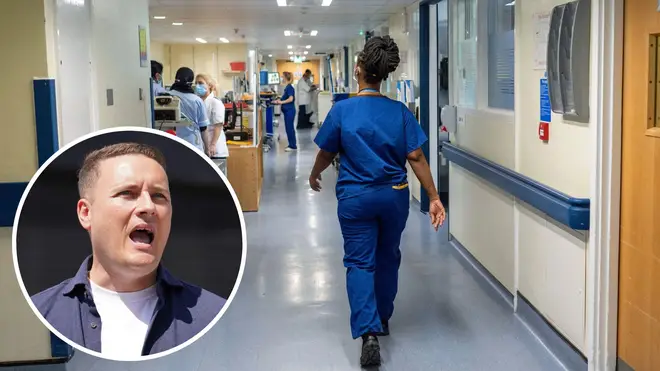
Ali Miraj 12pm - 3pm
5 July 2023, 07:40

NHS England Trusts have spent an average of £1 million each on external management consultancies and recruitment agencies in the first half of this year.
Branded "shocking" by shadow health secretary Wes Streeting, LBC's figures prompt fresh questions around the use of taxpayers' money within the NHS, which celebrates its 75th anniversary today.
According to data provided by 46 of NHS England's 215 trusts, a total of £46,336,807 has been spent on management consultants and recruitment agencies up to May 30th, including commitments covering the rest of the year, producing an average of over £1 million per trust.
There are a couple of salient reasons why NHS trusts turn to these organisations.
Management consultants are often employed to identify efficiencies, perhaps through the implementation of new IT systems, or advice on infrastructure projects, as well as to locate areas that could improve patient outcomes.
By contrast, recruitment agency costs are fees paid to firms that fill temporary and permanent workforce shortages within the NHS.

Critics, however, argue that the spending reflects years of underinvestment in the NHS, a point articulated by Mr Streeting when responding to LBC's findings.
"These are shocking figures uncovered by LBC - and they come at a time when taxes are at their highest level in 70 years. NHS waiting lists are at record levels and we know that the NHS is understaffed in so many areas," he said.
"It’s appalling to see so much public money being spent.
Read more: Rishi Sunak to recruit 300,000 new doctors and nurses in biggest shake up in NHS history
"Labour has long warned the Conservatives have been penny wise and pound foolish when it comes to where money is directed in the NHS because of their failure to invest in the recruitment and retention of doctors, nurses and other NHS staff over the course of a decade."
Currently, there are over 130,000 vacancies in the NHS, with questions of staff morale, retention and pay underscored by months of industrial action undertaken by nurses, junior doctors and ambulance staff.

Filling the gaps created by this workforce shortfall has placed more pressure on some trusts than others.
Of the £21m shelled out on recruitment agencies, the University Hospitals of Leicester NHS Trust alone accounted for £8.5 million in the opening months of this year, whereas other trusts had not paid a penny.
Aside from paying commission to these firms, hospitals are also having to incentivise locum staff to work for highly inflated fees in order to fill rotas, including one trust which offered £2,500 for a single nursing shift.
Seeking to address the shortage, and therefore reduce the estimated £3bn of annual agency bill the NHS faces, the government last week unveiled a 15-year workforce plan, doubling the number of medical training places by 2031 and increasing the NHS workforce by 330,000 by 2038.
The plan has, though, been criticised for failing to properly value the contributions of managers within the NHS and their ability to organise the system.
This concern was expressed by Sean Phillips, head of health and social care at the right-leaning think tank Policy Exchange, who went on to explain the implications of this for LBC's analysis, which found over £25m was spent on management consultants.
"There was less said in Sunak's plan about the managerial skills we need in the NHS," he said.
"We can draw from LBC's analysis that there is an overreliance or a sense of looking to external consultancy as being rather too much of a default option but actually that fundamental point is that there is a lack of analytical managerial capacity to deliver some of the complex plans that trusts are planning to deliver."
In response to LBC's findings, an NHS England spokesperson said: "The NHS is one of the most efficient health services in the world, and agency rules implemented in 2016 have saved around £600 million in efficiencies.
"The NHS Long-Term Workforce Plan, published last week, sets out how the NHS will address existing vacancies and meet the challenges of a growing and ageing population… and aims to reduce reliance on expensive agency spend that could cut the bill for taxpayers by around £10 billion between 2030/31 and 2036/37."